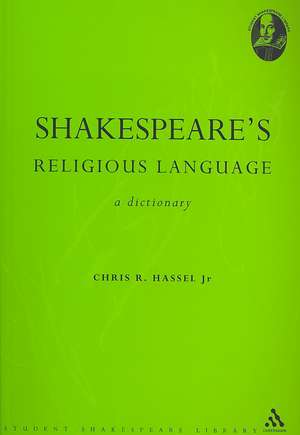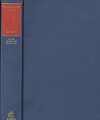Shakespeare's Religious Language: A Dictionary: Continuum Shakespeare Dictionaries
Autor Professor R. Chris Hassel Jr.en Limba Engleză Paperback – 17 mar 2007
Frequent attention is given to the prominence of Reformation controversy in these words, and to Shakespeare's often ingenious and playful metaphoric usage of them. Theological and religious commonplaces also assume a major place in the dictionary, as do overt references to biblical figures, biblical stories and biblical place-names; biblical allusions; church figures and saints.
Entries include: angel, baptism, catechism, cross, death's-head, devil, equivocation, evil, fool, Saint George, GOd, grace, heaven, idolatry, Jove, Lutheran, merit, Navarre, obsequy, Pope, pray, reform/reformation, sanctify, scripture, sin, soul, troth, unction, vice, and York.
Preț: 278.21 lei
Nou
Puncte Express: 417
Preț estimativ în valută:
53.24€ • 55.27$ • 44.39£
53.24€ • 55.27$ • 44.39£
Carte indisponibilă temporar
Doresc să fiu notificat când acest titlu va fi disponibil:
Se trimite...
Preluare comenzi: 021 569.72.76
Specificații
ISBN-13: 9780826493323
ISBN-10: 0826493327
Pagini: 480
Dimensiuni: 156 x 234 x 35 mm
Greutate: 0.74 kg
Ediția:New
Editura: Bloomsbury Publishing
Colecția Continuum
Seria Continuum Shakespeare Dictionaries
Locul publicării:London, United Kingdom
ISBN-10: 0826493327
Pagini: 480
Dimensiuni: 156 x 234 x 35 mm
Greutate: 0.74 kg
Ediția:New
Editura: Bloomsbury Publishing
Colecția Continuum
Seria Continuum Shakespeare Dictionaries
Locul publicării:London, United Kingdom
Caracteristici
Entries
follow
an
easy
to
use
three-part
structure:
definition
and
context
for
the
term
or
concept;
a
'guided-tour'
through
Shakespeare's
usage
of
the
term;
a
guide
to
further
reading.
Cuprins
Series
Editor's
Preface
Acknowledgments
Abbreviations
Introduction
Dictionary
Primary Bibliography
Secondary Bibliography
Index by Play
Index of entries
Acknowledgments
Abbreviations
Introduction
Dictionary
Primary Bibliography
Secondary Bibliography
Index by Play
Index of entries
Recenzii
Title
mention
and
reference
from
review
essay
in
Christianity
and
Literature,
Vol
55
No.
4,
2006
"This volume is one of the most impressive of the Athlone Shakespeare Dictionaries to appear. Given the recent scholarly interest in the dramatist's religious milieu, it will be a most useful addition to Shakespearean and Renaissance holdings...This volume is a necessary companion to Naseeb Shaheen's Biblical References in Shakespeare's Plays."
"Anyone writing a major, authoritative new reference work on Shakespeare and the Bible needs extraordinarily confident faith and persistent patience. R. Chris Hassel surely had both to have compiled Shakespeare's Religious Language, the product no doubt of decades of fruitful, hard work. Shakespeare and the bible has been the subject of much substantial scholarship as the 23-page "Secondary Bibliography" appended to Hassel's book attests. Hassel does much more than supply definitions for the religious language in Shakespeare's plays. Many of his entries are periscopes of great worth for literary critics and students of theology alike. He explores and explicates the figurative language in the plays and poems that manifests 'Shakespeare's most informed and imaginative religious usage' (xxii) and provides a running summary of scholarship on a particular term or phrase through references to the plethora of critical studies cited in his 'Second Bibliography.'. Moreover, and even more impressively, Hassel gives us a capstone history of the dominant creeds and polemics of the age by copiously cross-referencing and judiciously quoting from contemporary theological literature (sermons, treatises, tracts) where Shakespeare's religious terms are also found and from which he may have borrowed. Quoting Sandra Clark, editor of the Athlone Series, Hassel points out that 'half of all books extant between 1583 and 1623 were theological.' In light of such a devoutly Christian culture, it is not surprising that the 'amount and the range of Shakespeare's religious usage show him to be an unusually well-informed Christian layman even in the midst of this unusually well-informed Christian era' (xix). Hassel's entries are on the mark, clear and graceful. They range from a few short sentences (e.g., ban, confession, doctor, indulgence, procession, tithe pig, toll, St.Steven) to mini essays (e.g., despair, fools, grace, heaven, idolatry, Jew, miracles, sin). The degree of his specificity is remarkable. Anyone who seeks information on Shakespeare's religious language-it's meaning, documentation, scope, sources and context-will find in Hassel's dictionary a valuable and sure guide. Had Hassel's Dictionary been available, John Bunyan, I am convinced, would have kept it on his bookshelf."
"Chris Hassel is the right scholar to grasp the nettle of Shakespeare's religious language, since Hassel's authority where Shakespeare and religion are concerned is well established. "...this dictionary is a mine of helpful information, and everyone will learn something from it."- John D. Cox, Shakespeare Quarterly, 58.1, 2007
"This book mantains the high quality of previous volumes in the Athlone Shakespeare Dictionary Series... useful for research in both Elizabethan music and Shakespeare's use of music.... This is an authoritative volume that will be an important addition to collections in Elizabethan literature and music"
'Shakespeare's Religious Language, will undoubtedly become a useful source of systemised information and a helpful tool for further scholarly research in this area.'
'The great strength of Hassel's dictionary is that it is more than a dictionary, stepping past vocabulary into context... scrupulous in explaining what words need not mean...quicker and handier than an online concordance...and goes well beyond a dictionary's basic briefs; the helpfully selective bibliography is particularly strong on recent criticism... it should retain long-term value as a reference work, both for those in search of proof texts and those fascinated by the sinuous operation of Shakespearean religious metaphor.'
In a scholarly world that has awakened to Shakespeare's theological interests, it's a valuable reference work, especially for its definitions of terms that are no longer current ('compt' or 'sacring' or 'shrift').
"This volume is one of the most impressive of the Athlone Shakespeare Dictionaries to appear. Given the recent scholarly interest in the dramatist's religious milieu, it will be a most useful addition to Shakespearean and Renaissance holdings...This volume is a necessary companion to Naseeb Shaheen's Biblical References in Shakespeare's Plays."
"Anyone writing a major, authoritative new reference work on Shakespeare and the Bible needs extraordinarily confident faith and persistent patience. R. Chris Hassel surely had both to have compiled Shakespeare's Religious Language, the product no doubt of decades of fruitful, hard work. Shakespeare and the bible has been the subject of much substantial scholarship as the 23-page "Secondary Bibliography" appended to Hassel's book attests. Hassel does much more than supply definitions for the religious language in Shakespeare's plays. Many of his entries are periscopes of great worth for literary critics and students of theology alike. He explores and explicates the figurative language in the plays and poems that manifests 'Shakespeare's most informed and imaginative religious usage' (xxii) and provides a running summary of scholarship on a particular term or phrase through references to the plethora of critical studies cited in his 'Second Bibliography.'. Moreover, and even more impressively, Hassel gives us a capstone history of the dominant creeds and polemics of the age by copiously cross-referencing and judiciously quoting from contemporary theological literature (sermons, treatises, tracts) where Shakespeare's religious terms are also found and from which he may have borrowed. Quoting Sandra Clark, editor of the Athlone Series, Hassel points out that 'half of all books extant between 1583 and 1623 were theological.' In light of such a devoutly Christian culture, it is not surprising that the 'amount and the range of Shakespeare's religious usage show him to be an unusually well-informed Christian layman even in the midst of this unusually well-informed Christian era' (xix). Hassel's entries are on the mark, clear and graceful. They range from a few short sentences (e.g., ban, confession, doctor, indulgence, procession, tithe pig, toll, St.Steven) to mini essays (e.g., despair, fools, grace, heaven, idolatry, Jew, miracles, sin). The degree of his specificity is remarkable. Anyone who seeks information on Shakespeare's religious language-it's meaning, documentation, scope, sources and context-will find in Hassel's dictionary a valuable and sure guide. Had Hassel's Dictionary been available, John Bunyan, I am convinced, would have kept it on his bookshelf."
"Chris Hassel is the right scholar to grasp the nettle of Shakespeare's religious language, since Hassel's authority where Shakespeare and religion are concerned is well established. "...this dictionary is a mine of helpful information, and everyone will learn something from it."- John D. Cox, Shakespeare Quarterly, 58.1, 2007
"This book mantains the high quality of previous volumes in the Athlone Shakespeare Dictionary Series... useful for research in both Elizabethan music and Shakespeare's use of music.... This is an authoritative volume that will be an important addition to collections in Elizabethan literature and music"
'Shakespeare's Religious Language, will undoubtedly become a useful source of systemised information and a helpful tool for further scholarly research in this area.'
'The great strength of Hassel's dictionary is that it is more than a dictionary, stepping past vocabulary into context... scrupulous in explaining what words need not mean...quicker and handier than an online concordance...and goes well beyond a dictionary's basic briefs; the helpfully selective bibliography is particularly strong on recent criticism... it should retain long-term value as a reference work, both for those in search of proof texts and those fascinated by the sinuous operation of Shakespearean religious metaphor.'
In a scholarly world that has awakened to Shakespeare's theological interests, it's a valuable reference work, especially for its definitions of terms that are no longer current ('compt' or 'sacring' or 'shrift').










